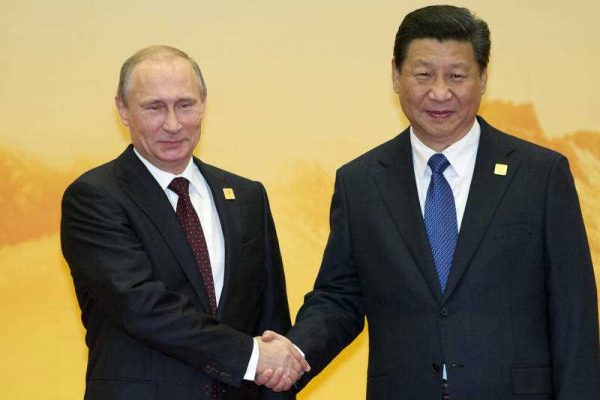To make all this work in the face of scepticism or even hostility from the US and its allies, China needs junior partners with influence, like fellow UNSC member and friend in need Russia, even though Putin’s strategic aims are quite different from Xi’s. At his November 2014 speech to the Central Work Conference on Foreign Relations Xi kept the neighbourhood and great powers firmly in the diplomatic framework. But he also added a new category of ‘major developing powers’ – presumably including Russia – to China’s diplomatic strategy.
Both sides are wary about a hostile international environment dominated by the US. But Xi’s view of the US is much more nuanced than Putin’s, who regards the US as Enemy Number One. The Chinese government is not afraid to criticise the US, but has not forgotten that China is probably the world’s greatest beneficiary of globalisation and the US-led Asian order. Xi Jinping sees a stable, if different, relationship with the US. ‘Fostering a more enabling international environment for peaceful development’ is important to the achievement of his ‘Two Centenary Goals’.
China has used the Russian government’s helpful obfuscation to remain on the fence regarding Ukraine. Official press commentary of Putin’s recent — and strongly anti-US — speeches is factual and neutral in tone. It’s probable the Chinese government is increasingly uncomfortable with Putin’s Ukraine policy and his anti-Western ranting, though they would not report this in the press. It seems even more likely that they would be aghast at his denial that China’s vast land neighbour Kazakhstan is a state.
In the meantime, China continues to enjoy the benefits of Russia’s military technology. The Russian News Agency reported on 14 November 2014 that Russia is ready to supply Su-35 fighter jets to China. This will be a resumption of hi-tech arms exports that were suspended several years ago. At that time China appeared to have reverse engineered Russia’s jet technology and put it on the market.
Russian Defence Minister Sergei Shoigu visited Beijing in November and announced a plan for new joint naval exercises in 2015, one in the Mediterranean and one in the Pacific. These two locations were presumably chosen to demonstrate the global reach of a Sino–Russian combined force. But the Chinese Defense Ministry was careful to specify to reporters that China follows ‘the principles of no confrontation and no alliance’. They did not repeat Shoigu’s claim that Russia ‘expressed concern over US attempts to strengthen its military and political clout in the Asia Pacific Region’.
But this year’s biggest Russian combat training exercise, Vostok 2014, appeared designed to test combat readiness against China itself, indicating less than complete strategic confidence in Putin’s new best friend.
In his State of the Union address in December, Putin gave the Asia Pacific the most cursory mention. He accorded more words to the Eurasian Economic Union. The EEU is the most obvious expression of Putin’s frustration at China’s dominance, as they jockey for economic and political power in Central Asia. Russia’s position is only likely to weaken: one of the main tenets of Xi’s foreign policy is the building of the ‘New Silk Roads’. The main route is overland, making a dogleg to Moscow almost as an afterthought after working its way through the Khorgos International Center for Boundary Cooperation, through Kirgizstan, Tajikistan and Uzbekistan, and on to Iran and Europe. It looks as though Chinese dominance of the Central Asian region will give little economic benefit to Russia.
In this transactional relationship, there is little strategic trust. China’s dominance will frustrate Russia, while Putin’s diplomatic alienation will increase the cost of China’s political support. Today’s confluence of interests will not last forever.
Rebecca Fabrizi is Senior Strategic Research Fellow at the Australian Centre on China in the World, College of Asia and the Pacific, ANU.


A very good concise overview of the present Eurasian region situation in what appears to be despairing situation for Russia in the midst of a number of crisis situation from Ukraine, Donbas region and Crimea, and more recently the deflation of the ruble in response to the dramatic drop in the price of oil by OPEC in countering the shale oil competition. The drop in price has not hurt Shale oil producers like the USA who seem to have maintained and increased production levels. Instead, Russia and its allies Venezuela has bore the brunt of the depreciation of the oil price, ie Ruble devaluation and the economic pinch on the hip pocket for the Russians. Hopefully, this will be temporary and Russia is able to weather the pain of Western disdain and OPEC oil crisis countering the shale oil phenomena. BRICS seems to have been placed on the backwater for the moment and the Chinese led Asian Banking group recently announced in 2014 has clearly elevated China as the hegemonic power of Asia Pacific region with Russia having to rely on their gas energy power resources and military clout in order to bolster their regional confluence parity with China. It seems that Russia geo-political position inspite China’s nascent economic rise will remain potent as Vostok 2014 has demonstrated. I would suggest that the Russia will consolidate its changing influential position in the region and outwardly with multipolarity partnerships with global partners and it is the world who has to get used to the chaning landscape of the Russian geo-political regional map and not the other way round.
The cozier Sino-Russian relationship is the outcome of geopolitical necessity. Putin is pushed closer to Xi due to severe Western sanctions. It will stay longer than expected.